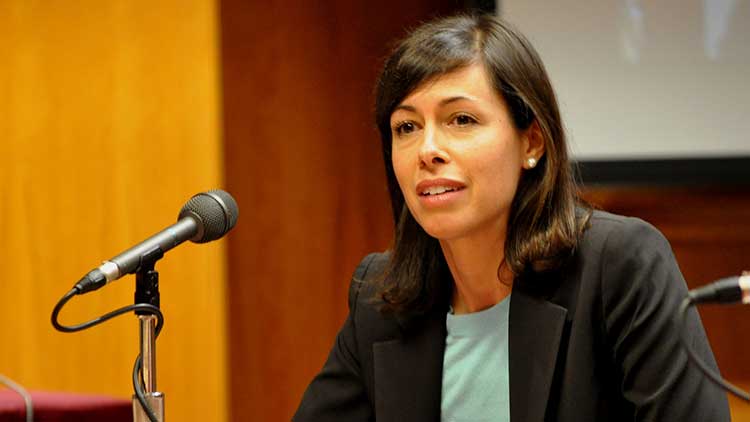NAB 2018: Rosenworcel Sees FCC Threat to News as Check on Power

The smarter way to stay on top of broadcasting and cable industry. Sign up below
You are now subscribed
Your newsletter sign-up was successful
FCC Commissioner Jessica Rosenworcel said that while tension between the White House and the press is nothing new, that is not what the attacks by President Donald Trump on mainstream media are about, and they are unacceptable. She also suggested there might be some link between what she saw as an assault on the First Amendment and what she saw as FCC favoritism toward the Sinclair-Tribune deal.
That came in a speech to the NAB Show in Las Vegas Monday (April 9).
"What is happening now is what journalism Professor Jay Rosen has called 'not just attacking the press but the conditions that make it possible for news reports to serve as any kind of check on power,'" she said.
Related: Trump Says Network News Licenses Must Be Challenged
Rosenworcel cited her shock at a presidential tweet last October threatening to challenge NBC broadcast licenses over 'fake news.'
She said that was when her line was crossed on the issue. She tweeted herself, pointing out the President did not have such power, linking to the "33-page single spaced primer on FCC broadcasting rules."
She gave NAB President Gordon Smith kudos for his own statement on the subject: “The founders of our nation set as a cornerstone of our democracy the First Amendment, forever enshrining and protecting freedom of the press. It is contrary to this fundamental right for any government official to threaten the revocation of an FCC license simply because of disagreement with the reporting of a journalist."
The smarter way to stay on top of broadcasting and cable industry. Sign up below
She suggested the "specter of fake news intersecting with the work of the FCC" was also demonstrated by media ownership changes.
"I wish it [the President's tweeted suggestion of license revocation] was the only time when I saw an attack on the conditions that make it possible for news reports to serve as a check on power," she said, "[b]ut it’s not. More recently, the FCC has been changing its media policy rules from front to back—bringing back the scientifically obsolete UHF discount, changing how many of the most-watched stations a single broadcaster can own in a market, and ending the rule that requires the ability to broadcast from the city where a station is licensed.
"Some of these policies are in need up updating—and there’s an honest conversation to be had about that," she conceded. "But collectively, they have the distinction of clearing the way for a transaction right now pending before the FCC. It’s a merger that could result in a single broadcast company—Sinclair—having the unprecedented ability to reach 72% of our nation’s households. This is a company that is not only getting special treatment from the FCC—it’s getting a special call-out from the Executive Branch. This is important for all the reasons I’ve discussed today. So stay tuned. "
Contributing editor John Eggerton has been an editor and/or writer on media regulation, legislation and policy for over four decades, including covering the FCC, FTC, Congress, the major media trade associations, and the federal courts. In addition to Multichannel News and Broadcasting + Cable, his work has appeared in Radio World, TV Technology, TV Fax, This Week in Consumer Electronics, Variety and the Encyclopedia Britannica.

